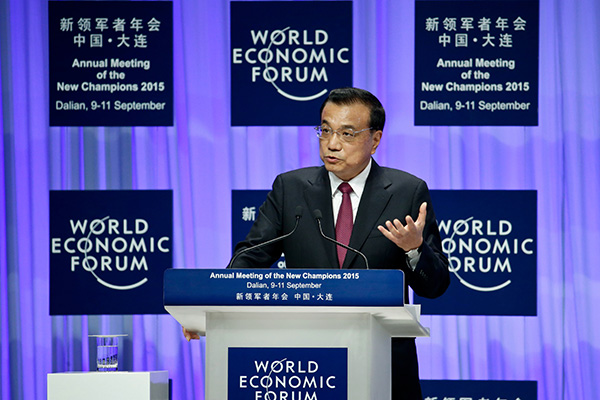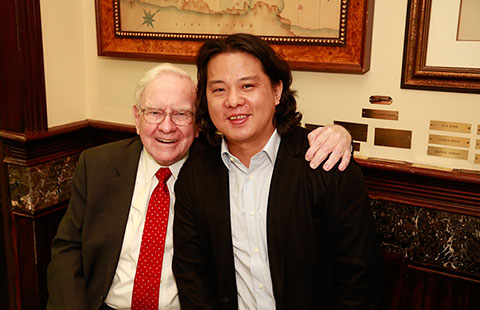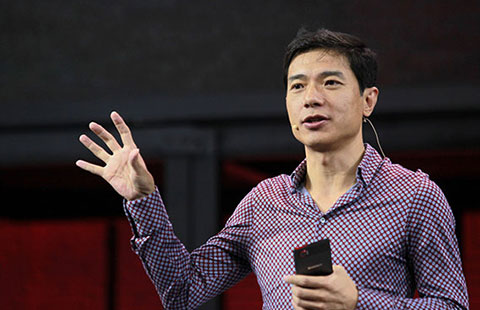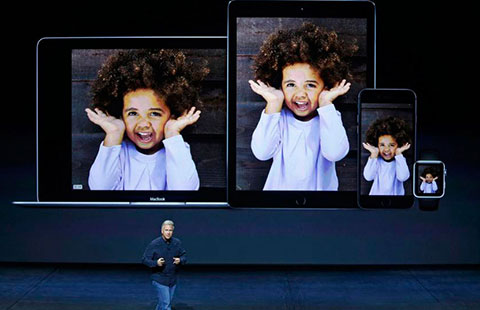A new blueprint for global growth
(chinadaily.com.cn) Updated: 2015-09-11 16:41
 |
|
Premier Li Keqiang speaks at the Annual Meeting of the New Champions of the World Economic Forum in Dalian, Liaoning province on September 10, 2015. [Photo provided to China Daily] |
Professor Klaus Schwab,
Heads of State and Government,
Distinguished Guests,
Ladies and Gentlemen,
It gives me great pleasure to join you in the beautiful city of Dalian in this golden autumn season of September. On behalf of the Chinese government, let me extend warm congratulations on the opening of the Annual Meeting of the New Champions. I want to welcome all guests who have traveled from afar to Dalian and I also express my sincere thanks to friends from the media.
Yesterday, I visited a local makers' space in Dalian after I arrived. The company, which employs only ten people, has built an impressive business in just two years' time. It has attracted 280,000 registered users through the Internet, and developed nearly 100 maker products. One thing it does is to develop new models for the utilization of machine tools. It has collected data of some 30,000 machine tools in northeast China, and managed to link the production of machine tools with consumers on the demand side. Their service greatly improved the utilization rate of these machine tools. More importantly, building on the wisdom of its 280,000 registered users, it has offered smart solutions for upgrading machine tools. The company has an ambitious plan – to not just upgrade the old machine tools, but also build new and smarter ones by pooling wisdom via a public platform. In fact, one could find tens of thousands of small companies like this in China, whose creativity is beyond our imagination. Whether they succeed in the end, they are all like the new champions. Through them, people see the future of our economy, and I believe they are all part of the new blueprint for growth in China and beyond.
At the moment, global economic recovery is still weak. Many international institutions have downgraded their global economic forecast. The more complex and intricate the situation, the more we need confidence and hope. In this context, the theme of the meeting – Charting a New Course for Growth – reflects our collective wisdom and consensus, and points the way for the future. It is therefore highly relevant.
I hope the story I shared with you could somehow help answer your question about the status and direction of the Chinese economy and the future of the world. My message is this: despite the moderation in speed, the performance of the Chinese economy is stable and moving in a positive direction. Although difficulties remain, there are more opportunities than challenges. People's creativity and entrepreneurial passion has given us confidence to overcome the challenges. We are capable of meeting the main goals and tasks set for economic and social development this year, and this will lay a solid foundation for sustainable growth in the years to come.
Given the slowdown in global growth, the 7 percent growth China achieved in the first half of the year is not at all easy. Because we are talking about a $10 trillion economy, for which 7 percent growth actually generates more increase in volume than the double-digit growth in the past. And the 7 percent growth is in fact among the highest of the world's major economies. What is more encouraging is that China's economic structure is rapidly improving. Today, the services sector already accounts for half of China's GDP, and consumption contributes 60 percent to growth. Growth in high-tech industries is notably higher than the entire industrial sector. Consumer demands for information, cultural, health and tourism products are booming. Energy conservation, environmental protection and the green economy are thriving. New economic growth areas are rapidly taking shape.
- A new blueprint for global growth
- Details of US Precision Medicine Initiative to be released
- Sanhe Hopefull to invest $317m in Jiangsu vegetable oil refinery
- Nippon Paint China to expand and promote regional economy
- A million dollar lunch with billionaire Warren Buffett
- FTA to boost Australia's Chinese wine sales
- Sri Lanka aims to boost tourism, eyes more Chinese visitors
- Fuzhou New District already on the radar of foreign investors
















